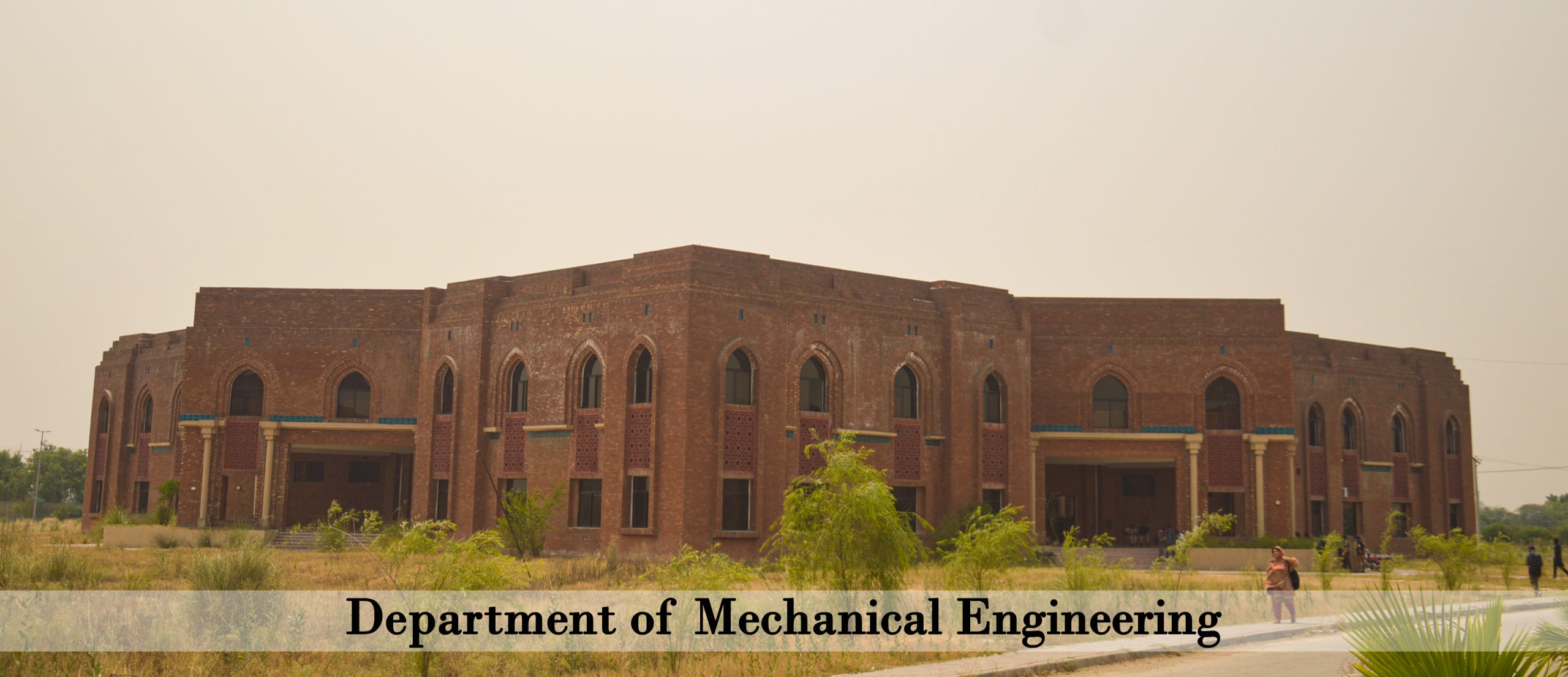The department of Mechanical engineering was established in 2012. Currently it has an enrolment of about 178 students at undergraduate level. So far by year 2018, around 130 students have graduated from the department and have successfully received registration numbers from Pakistan Engineering Council (PEC). The department is now shifted towards OBE system as per PEC requirement. The department is comprises of foreign qualified Ph.D. and M.Sc. faculty members to provide fine level of teaching to the students and to enhance the research projects as well.
The department is offering 4 years B.Sc. Mechanical Engineering Program. According to PEC & HEC guidelines, the total credit hours for this program are 136. The credit hours are divided in theoretical materials, practical laboratories and engineering training/projects in well-established engineering facilities. To complete the practical part of mechanical engineering study, the department provides scientific laboratories with upgraded machinery and software to elevate and improve the practical training of the students in his/her all studying levels. The good economy of country relies largely on total productivity which is highly dependent on mechanical engineers. The department is well equipped with laboratories like Fluid engineering, Dynamics of machinery, Machine design, Mechanics of materials and Workshops to meet the demand of well trained and professionally sound mechanical engineers.
Mechanical Engineering Program Mission
To produce mechanical engineers equipped with knowledge and skills to carry on lifelong learning through quality teaching and training, Our graduates shall be able to serve for the sustainability development of the society while demonstrating professional ethics and responsible social conduct
Mechanical Engineering Program Educational Outcomes(PEO’s)
PEO-1
Apply the knowledge to solve analytical and practical mechanical engineering programs (Engineering Capabilities)
PEO-2
Work for continuous professional and sustainable socio-technical development. (Social Development and Lifelong Learning)
PEO-3
Demonstrate professional ethics effective communication and managerial skills. (Ethics, Management, and Communications)
Mechanical Engineering Program Educational Outcomes(PLO’s)
PLO-1 Engineering Knowledge: An ability to apply knowledge of mathematics, science, engineering fundamentals and an engineering specialization to the solution of complex engineering problems.
PLO-2 Problem Analysis: An ability to identify, formulate, research literature, and analyze complex engineering problems reaching substantiated conclusions using first principles of mathematics, natural sciences and engineering sciences.
PLO-3 Design/Development of Solutions: An ability to design solutions for complex engineering problems and design systems, components or processes that meet specified needs with appropriate consideration for public health and safety, cultural, societal, and environmental considerations.
PLO-4 Investigation : An ability to investigate complex engineering problems in a methodical way including literature survey, design and conduct of experiments, analysis and interpretation of experimental data, and synthesis of information to derive valid conclusions.
PLO-5 Modern Tool Usage: An ability to create, select and apply appropriate techniques, resources, and modern engineering and IT tools, including prediction and modeling, to complex engineering activities, with an understanding of the limitations.
PLO-6 The Engineer and Society: An ability to apply reasoning informed by contextual knowledge to assess societal, health, safety, legal and cultural issues and the consequent responsibilities relevant to professional engineering practice and solution to complex engineering problems.
PLO-7 Environment and Sustainability: An ability to understand the impact of professional engineering solutions in societal and environmental contexts and demonstrate knowledge of and need for sustainable development.
PLO-8 Ethics: Apply ethical principles and commit to professional ethics and responsibilities and norms of engineering practice.
PLO-9 Individual and Teamwork: An ability to work effectively, as an individual or in a team, on multifaceted and /or multidisciplinary settings.
PLO-10 Communication: An ability to communicate effectively, orally as well as in writing, on complex engineering activities with the engineering community and with society at large, such as being able to comprehend and write effective reports and design documentation, make effective presentations, and give and receive clear instructions.
PLO-11 Project Management: An ability to demonstrate management skills and apply engineering principles to one’s own work, as a member and/or leader in a team, to manage projects in a multidisciplinary environment
PLO-12 Lifelong Learning: An ability to recognize importance of and pursue lifelong learning in the broader context of innovation and technological developments

